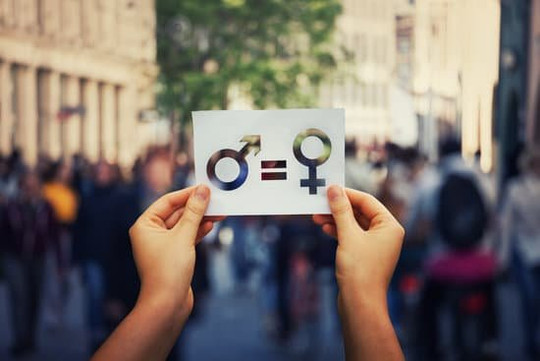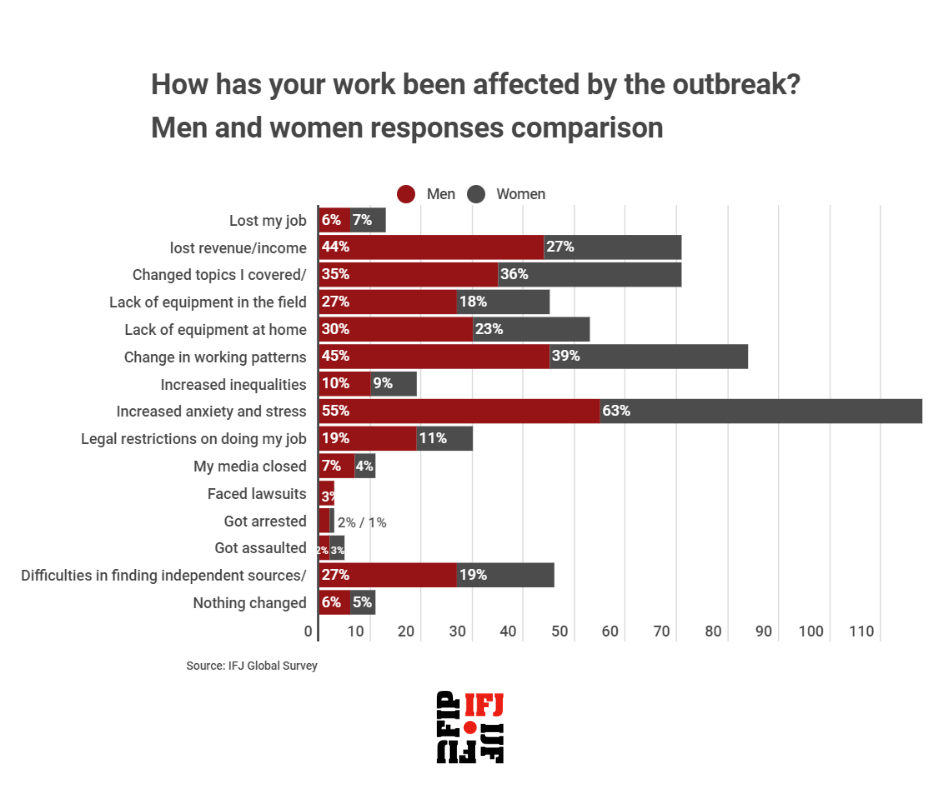While women journalists’ working conditions tend to be less affected by the COVID-19 outbreak than those of men , two-thirds of women have suffered higher stress and anxiety as a result of the crisis compared to just half of men.
The survey, carried out by the IFJ, the world's leading journalists' organisation representing 600.000 journalists in 146 countries on 26 - 28 April, gathered 1308 responses from 77 countries, out of which 42% were female.
While three-quarters of all journalists have faced restrictions in reporting on Covid-19, the IFJ global survey results on the impact of COVID on press freedom shows that women tend to be generally equally or less impacted by the pandemic.
- 35% of women and men have shifted their focus to covering Covid-19 related stories.
- Only a quarter of women as opposed to almost half of men have claimed a loss of revenue
- 7,4% of women against 6,5% of men have lost their jobs
- Women suffer less than men from lack of equipment at home and in the field
- 19% of women against 27,5% men have claimed difficulties in finding independent sources
- Almost 10% of both women and men pointed at increased inequalities at work
While the survey results seem to contradict ILO research according to which certain groups , including women, would be disproportionately affected by the pandemic jobs crisis, in particular people in less protected and low-paid jobs, many women journalists insist that the situation was already bad before the pandemic outbreak and that Corona has just made things worse.
"My main problem, rather than freedom, is simply being able to place stories at all nowadays" says a female freelance journalist from Argentina.
“This is a period that brings to light the most serious difficulties of an already precarious and fragile sector” says a Portuguese journalist.
The survey however shows that 2/3 of women as opposed to half of men have experienced increased anxiety and stress.
“I worry about the mental health of reporters constantly researching something that makes all of us anxious. I also worry about freelance rates being cut when they were already low. Perhaps they won’t recover”, says a UK journalist.
The IFJ is concerned that the highest level of anxiety experienced by women has had an impact on their well-being, their work and their private life.
The federation points in particular at the effect of lockdown provisions on journalists’ private lives and the stress amplified by the combination of journalism duties and caregiving responsibilities which often fall on women.
“A lot of female colleagues are complaining about the difficulty to reconcile work and private life, says Sofia Branco, President of the Portuguese union of journalists and a member of the IFJ executive board. “ I fear that the ongoing impact of COVID will be more severe on women“.
“We are in a situation where gender roles have been exacerbated and women journalists are no exception to that. How can you feel ok when the appropriate time for finalising your stories is before 8 o’clock in the morning or after 10 o’clock at night because the rest of your time is allocated to your family responsibilities? “, says IFJ Gender Council chair Maria Angeles Samperio.
The federation has joined other global union federations in denouncing the effect of COVID-19 on women in the frontline. A series of webinars will be launched in the course of May to gather experiences from women workers across the globe.


